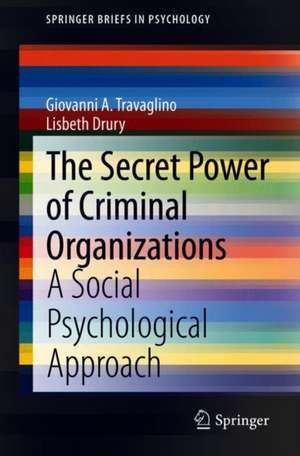The Secret Power of Criminal Organizations: A Social Psychological Approach: SpringerBriefs in Psychology
Autor Giovanni A. Travaglino, Lisbeth Druryen Limba Engleză Paperback – 3 sep 2020
Din seria SpringerBriefs in Psychology
-
 Preț: 345.89 lei
Preț: 345.89 lei - 17%
 Preț: 359.88 lei
Preț: 359.88 lei -
 Preț: 346.86 lei
Preț: 346.86 lei - 5%
 Preț: 375.88 lei
Preț: 375.88 lei -
 Preț: 479.67 lei
Preț: 479.67 lei - 5%
 Preț: 413.07 lei
Preț: 413.07 lei -
 Preț: 380.84 lei
Preț: 380.84 lei -
 Preț: 377.35 lei
Preț: 377.35 lei -
 Preț: 408.66 lei
Preț: 408.66 lei -
 Preț: 477.56 lei
Preț: 477.56 lei -
 Preț: 344.36 lei
Preț: 344.36 lei - 5%
 Preț: 421.92 lei
Preț: 421.92 lei -
 Preț: 479.47 lei
Preț: 479.47 lei -
 Preț: 441.85 lei
Preț: 441.85 lei -
 Preț: 478.53 lei
Preț: 478.53 lei -
 Preț: 443.97 lei
Preț: 443.97 lei -
 Preț: 376.43 lei
Preț: 376.43 lei - 5%
 Preț: 356.32 lei
Preț: 356.32 lei -
 Preț: 443.75 lei
Preț: 443.75 lei -
 Preț: 411.75 lei
Preț: 411.75 lei - 15%
 Preț: 462.51 lei
Preț: 462.51 lei -
 Preț: 412.89 lei
Preț: 412.89 lei -
 Preț: 374.46 lei
Preț: 374.46 lei -
 Preț: 377.18 lei
Preț: 377.18 lei - 15%
 Preț: 463.68 lei
Preț: 463.68 lei -
 Preț: 343.88 lei
Preț: 343.88 lei -
 Preț: 474.45 lei
Preț: 474.45 lei -
 Preț: 376.22 lei
Preț: 376.22 lei - 15%
 Preț: 461.54 lei
Preț: 461.54 lei -
 Preț: 378.34 lei
Preț: 378.34 lei - 5%
 Preț: 357.23 lei
Preț: 357.23 lei -
 Preț: 342.74 lei
Preț: 342.74 lei -
 Preț: 376.80 lei
Preț: 376.80 lei -
 Preț: 376.04 lei
Preț: 376.04 lei -
 Preț: 376.22 lei
Preț: 376.22 lei -
 Preț: 344.25 lei
Preț: 344.25 lei -
 Preț: 442.44 lei
Preț: 442.44 lei -
 Preț: 375.23 lei
Preț: 375.23 lei -
 Preț: 374.85 lei
Preț: 374.85 lei -
 Preț: 347.32 lei
Preț: 347.32 lei -
 Preț: 409.80 lei
Preț: 409.80 lei -
 Preț: 374.85 lei
Preț: 374.85 lei -
 Preț: 414.42 lei
Preț: 414.42 lei -
 Preț: 344.10 lei
Preț: 344.10 lei -
 Preț: 446.65 lei
Preț: 446.65 lei -
 Preț: 476.79 lei
Preț: 476.79 lei -
 Preț: 379.68 lei
Preț: 379.68 lei -
 Preț: 380.07 lei
Preț: 380.07 lei -
 Preț: 408.44 lei
Preț: 408.44 lei -
 Preț: 376.43 lei
Preț: 376.43 lei
Preț: 375.23 lei
Nou
Puncte Express: 563
Preț estimativ în valută:
71.81€ • 74.69$ • 59.28£
71.81€ • 74.69$ • 59.28£
Carte tipărită la comandă
Livrare economică 15-29 aprilie
Preluare comenzi: 021 569.72.76
Specificații
ISBN-13: 9783030441609
ISBN-10: 3030441601
Pagini: 66
Ilustrații: VI, 66 p. 4 illus.
Dimensiuni: 155 x 235 mm
Greutate: 0.11 kg
Ediția:1st ed. 2020
Editura: Springer International Publishing
Colecția Springer
Seria SpringerBriefs in Psychology
Locul publicării:Cham, Switzerland
ISBN-10: 3030441601
Pagini: 66
Ilustrații: VI, 66 p. 4 illus.
Dimensiuni: 155 x 235 mm
Greutate: 0.11 kg
Ediția:1st ed. 2020
Editura: Springer International Publishing
Colecția Springer
Seria SpringerBriefs in Psychology
Locul publicării:Cham, Switzerland
Cuprins
Introduction: Criminal Organisations and the Community.- Intracultural Appropriation Theory and Omertà.- Honour, Masculinity and Organised Crime.- Identity and Social Change.- Intergroup contact, Culture and Criminal Groups.- Criminal Organisations, Social Banditry and Political Behaviour.- Conclusions: Towards a Social Psychology of Organised Crime.
Notă biografică
Giovanni A. Travaglino, PhD, is an Assistant Professor in Applied Psychology at the Chinese University of Hong Kong (Shenzhen), and Lecturer in Social and Organizational Psychology at CSGP, School of Psychology, University of Kent. His research focuses on resistance to criminal organisations and, more broadly, on group processes and inter-group relations in different cultural contexts. He is co-editor with Benjamin Abrams of Contention: The Multidisciplinary Journal of Social Protest and founder of the Interdisciplinary Network for Social Protest Research.
Lisbeth Drury, PhD, is a Lecturer in Organizational Psychology at Birkbeck, University of London. Her research examines on the impact and antecedents of inter-group relations across a range of public, private and organizational settings. She is a consulting editor for the journal Group Processes and Intergroup Relations.
Lisbeth Drury, PhD, is a Lecturer in Organizational Psychology at Birkbeck, University of London. Her research examines on the impact and antecedents of inter-group relations across a range of public, private and organizational settings. She is a consulting editor for the journal Group Processes and Intergroup Relations.
Textul de pe ultima copertă
This Brief presents a social psychological approach to understanding the reaction of communities to organized crime and illegal groups. Based on a new theoretical framework and the latest empirical evidence, this book explores questions of how criminal organizations are able to gain power and exert governance over entire territories. This book draws on the prototypical example of Italian organized crime and analyzes the thesis that the power of criminal groups is grounded in dynamics of legitimization rather than fear or coercion. The compliance of a community is seen here as stemming from the endorsement of specific cultural values and norms. These cultural values are actively appropriated, mobilized and transmitted by criminal groups, a dynamic the authors have labeled Intracultural Appropriation Theory. The book emphasizes what can be learned from using this emerging theory in similar settings such as those of terrorist groups and violent gangs, and points the way to solutionsfor this social problem.
Caracteristici
Presents a new perspective on organized crime and other extreme and criminal groups Evidence based view of community interactions with criminal organizations Brings together viewpoints from sociology, anthropology, political science and psychology Highlights cultural values as a key factor in communities’ interaction with criminal groups
